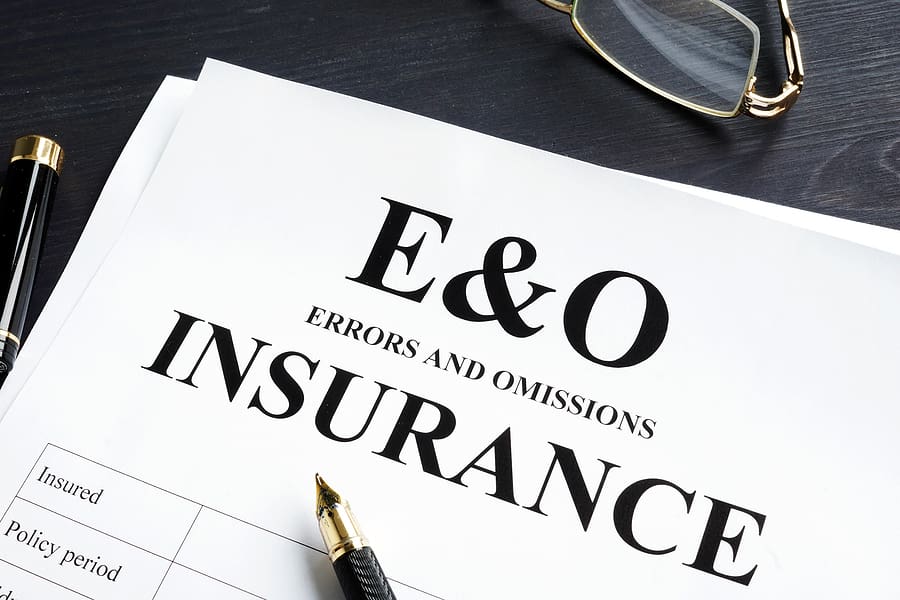
What is Professional Liability Insurance?

To err is human. Even professionals with the best intentions can slip up, have a lapse in judgment, or simply forget something. Unfortunately, such mistakes can be costly to your clients and customers, leaving you liable for upwards of millions of dollars in legal fees and damages. Professional liability insurance can help protect you from being on the hook following an error or breach of contract.
Professional liability insurance (PL) is an insurance policy that pays for damages done to others because of your failure to adhere to contractual obligations. You may be more familiar with the terms “errors and omissions insurance” or “medical malpractice insurance,” both of which are used interchangeably with PL insurance.
What would happen if one of your clients took you to court after claiming a service you provided them led to economic or financial damages? Without professional liability insurance, you would be responsible, or liable, for covering those costly legal fees — even if you believed you didn’t do anything wrong.
And what if you lost the case or decided to settle? That’s right — without PL insurance, you’d be responsible for paying any judgment or settlement. Such an event could force you out of business and into bankruptcy, even if the claim arose from nothing more than a simple mistake.
What does PL insurance cover?
Professional liability insurance pays for damages to your customers or clients as a result of:
- Negligence,
- Malpractice,
- Errors,
- Misrepresentation,
- Incomplete or inaccurate work, and
- Breaches of contract.
In the event you receive a lawsuit for damages, PL insurance would pay for your legal defense and any damages awarded to the other party.
Let’s say you’re a computer repair technician who takes on a job to repair a client’s computer. During your repairs, you accidentally erase their data. Though it’s an understandable and unintentional mistake, you’d be held responsible for legal fees and damages unless you’re protected by errors and omissions insurance.
Similarly, assume you’re working with a client who depends on you to fulfill a service by a concrete deadline. For whatever reason, you miss the deadline and cause your client to lose out on a significant contract with a large firm. Because you failed to deliver by the deadline and cost your client business, your client files suit against you.
Professional liability insurance would cover your legal fees and any damages you owed, preventing you from going out of business. (And, hopefully, you’d have learned from your mistake!)
Professional liability insurance vs. general liability insurance
Because PL insurance covers errors and omissions, you’re protected from non-physical claims. In contrast, general liability insurance covers claims of bodily injury and property damage.
A customer tripping and breaking a leg in your store wouldn’t be covered by your errors and omissions insurance, but by your general liability policy.
On the flip side, an accountant who forgets to file a client’s taxes on time, causing the IRS to penalize the client for late payment, would be covered by professional liability insurance because the client would have suffered economic or financial damages — not physical.
Think of PL insurance as “white-collar” coverage and general liability insurance as “blue-collar” insurance.
Consultants, real estate agents, insurance agents, attorneys, and other professionals have higher exposure to the risks covered by errors and omissions insurance. As such, their premiums for PL insurance would be higher than those paid by a plumber, carpenter, or convenience store owner.
The reverse is true, as well. Professional service providers are less likely to have claims against them for bodily injury or property damage, so they would pay less for general liability insurance.
However, professional liability insurance would cover bodily injury or property damage if it’s a result of your profession. For example, if an architect’s building plan contained an unnoticed design flaw that led to structural collapse and subsequent injury, the architect would be covered by their PL policy.
When do you need professional liability insurance?
Professional liability insurance protects you from claims asserting you failed to hold up your end of a contract, whether or not those claims have any merit. You should strongly consider purchasing professional liability, errors and omissions, or medical malpractice insurance if you are a service provider, such as a(n):
- Accountant
- Attorney
- Architect
- Designer
- Engineer
- Financial advisor
- Photographer
- Real estate agent
- Or other service provider
And remember: even if you did nothing wrong, you may still have to defend against a claim. After all, you don’t need to be a millionaire to get sued like one.
Some states or regulatory bodies may even require you to carry some degree of PL coverage. In other cases, clients or customers may refuse to sign a contract with you unless you’re covered by a PL policy.
With professional liability insurance, you can continue to provide your services and expertise with the knowledge that you’re protected from liability if something goes awry, from a human error you could never hope to account for to a breach of contract.
https://coterieinsurance.com/blog/what-is-professional-liability-insurance/
